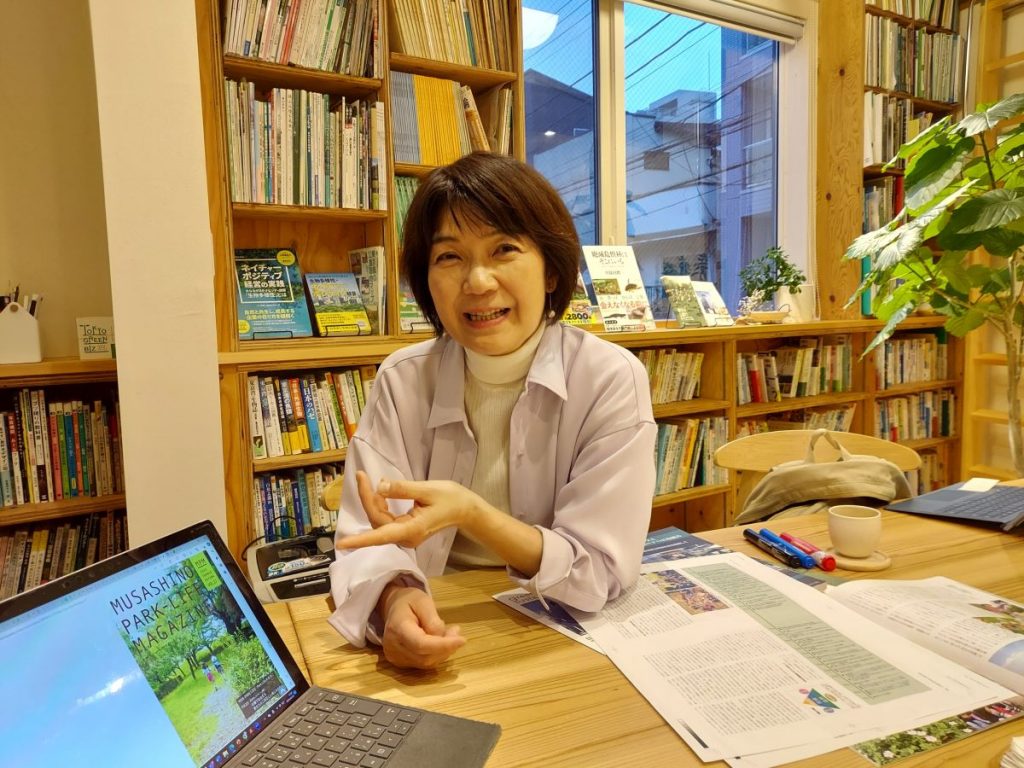このページを 日本語 で読む
Maintaining nature in our cities is a never-ending job. Rumi Satoh is on the front lines of this work as the Executive Director of NPO birth, a nonprofit based in Nishi-Tokyo City. Roughly 30 years ago, Satoh became concerned about the disappearance of nature alongside development. She got together a group of like-minded people and organized. Since then, NPO birth's ongoing work has been aimed at preserving urban green spaces while communicating the wonder of nature.
Vanishing Nature
Satoh's journey began during her university years when she moved from Sendai to Tokyo. She was captivated by the abundant nature in the Tokyo suburb of Fuchu, where she attended the Tokyo University of Agriculture and Technology.
Known as the Musashino Plateau, the area had vast fields for farming due to the development of irrigation channels to bring water from the Tama River. Japanese oak and zelkova trees stood around homes and both served as windbreaks and could be used for building materials. Mixed woods behind the fields regenerated quickly even while being harvested for firewood. Fallen leaves were used for compost.
These wooded areas provided food and habitats for birds, and the fallen leaves nurtured soil and insects. While benefiting from nature's blessings, she realized that human intervention actually nurtured diverse life forms.
Then Satoh witnessed the ongoing disappearance of these natural spaces. They were replaced by homes, shops, and inorganic structures and roads made from concrete. She also sensed a shift in people's attitudes towards coexisting with nature. This moved to her act.
Fostering Community
After graduation, Satoh began working for a company involved in nature education. On weekends, she participated in citizen group activities to maintain local woods and rice fields.
In 1997, together with a group of like-minded people, Satoh founded a nonprofit. NPO birth's objective is to foster better relationships between people and nature. They first faced the challenge of how to reconnect people with nature. The approach they adopted was to "foster communities based on the natural environment."
In many cities abroad such as those in the United States, urban development centered on green spaces was already underway. Local nonprofits played a key role. Activities included increasing the number of roadside trees and creating flowers and vegetable community gardens where people could gather. Through these green spaces, people could enjoy nature and socialize, and children could learn through interaction with nature. The result was the creation of healthy and culturally rich community spaces.
Meanwhile in Japan, focus was placed on city parks and suburban green spaces. A system was put in place that allowed private companies and nonprofits to manage public facilities.
Starting with the management of the Sayama Hills Tokyo Metropolitan Park, NPO birth began its work in management. The nonprofit is now entrusted with the management of 18 Metropolitan parks and 54 city parks in Nishi-Tokyo. Starting last year, the group has also gotten involved in managing city parks in the Kansai region.
Art and Yoga
Managing the parks is not just about conserving flora and fauna. NPO birth offers numerous nature interpretation and experience programs. Specialized staff tailor events to various age groups to foster interest and appreciation for nature. A yearly favorite among children is the "Grasshopper Land" program in which participants search for insects after grass is mowed.
The group is also eager to enhance the value of parks in communities. They collaborate with artists to organize outdoor exhibits, organize workshops, live music performances, and even yoga classes. There has also been a recent increase in citizen-proposed projects.
"Parks can serve as a starting point for connecting not only people with nature, but people with people," Satoh explains.
"In so doing, we enhance the vitality of our cities. Urban green spaces not only address environmental issues, but provide solutions to social problems such as the weakening of community ties, the quality of education, and health. Nature brings smiles to people's faces, and we want more people to recognize its value," she adds with passion.
このページを 日本語 で読む
